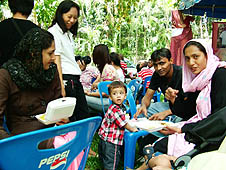 |
| People during the event organized by the Jesuit Refugee Service in Bangkok |
Refugees are not people experiencing economic difficulties but people who face possible death if they remain in their home countries, participants at a World Refugee Day program in Bangkok learnt.
“As Tamils, my family was threatened. We were afraid to be killed by the military and therefore decided to escape,” said Thulika, 18, a Sri Lankan.
“In Thailand, even though we are not threatened, we are still not free … We can’t work legally. My brother and myself can’t go to school,” said Thulika, who came to Thailand four years ago to escape the civil war.
Thulika was one of two refugees who spoke about their plight during a June 20 Mass organized by the Jesuit Refugee Service (JRS) to mark World Refugee Day and the service’s 30th anniversary.
Refugees did not leave their countries “because we didn’t have work … but because we were threatened and did not have a secure life,” Thulika told Mass participants, which included some 50 refugees.
Pakistan’s Ahmadi community, regarded by many Muslims as a heretical Islamic sect, faces similar danger.
“Ahmadis as a minority in Pakistan have been threatened since 1953,” said Shama, a young woman refugee from the community.
“In 1984, the president made our group illegal. We were attacked every day. My father was injured, my brother’s friends were killed.”
JRS’ task is to protect the lives of refugees and ensure they apply for refugee status, JRS director Father Bernard Arputhasamy said on the sidelines of the event.
The organization collaborates with the government, NGOs, civil society, the United Nations and the public for these purposes, said the priest.
JRS in Thailand presently works with refugees both inside and outside refugee camps in Bangkok and in areas bordering Myanmar.
In addition to providing food, clothing and medicine, the organization also arranges vocational training and language and computer classes for them.
SOURCE : UCANEWS
No comments:
Post a Comment